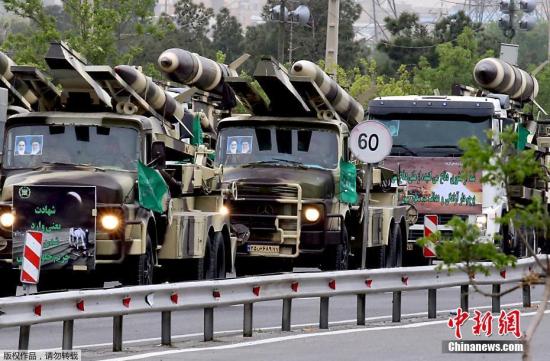China News Service, November 30, reported that the head of Iran’s Ministry of Defense’s nuclear program, Fahrizad, was assassinated a few days ago. His burial ceremony will be held on the 30th local time.
Although no organization or individual has announced that it has made the attack, the Iranian side believes that the attack was planned and implemented by Israel and will take retaliatory action at "the appropriate time."
In recent years, Iran has repeatedly become the key fire source in the "powder barrel" in the Middle East, which is crucial to the stability of the regional situation.
The chain reaction triggered by this incident will continue...
Data map: Iranian President Rouhani.
[
Senior officials killed Iran and released photos of suspects, claiming that the culprit was...
]
During the driving of the vehicle, fierce explosions and gunfire suddenly sounded back and forth, and many people were killed, including a very prominent senior official... On the afternoon of November 27, local time, it was 60 kilometers northeast of Tehran, the capital of Iran. There, an unusual scene happened in the driveway near Abu Shad village.
The senior official killed in the attack was Fahrizad, head of Iran’s Ministry of Defense’s nuclear program.
The car he was riding in exploded, followed by a shooting, killing many people.
The Iranian Ministry of Defense said that Fahrizad was sent to a doctor for treatment after he was seriously injured in the attack, but the rescue failed.
Later, in a cabinet meeting on live television, Iranian President Rouhani expressed his attitude on the matter.
He pointed out that Tehran will take retaliatory action at the "right time" and Israel is the "culprit."
Rouhani accused Israel of intending to "create chaos" through this murder.
In this regard, on the 28th local time, Israeli Cabinet Minister Hazabi stated that he "does not know" who was behind the Fahrizad murder.
Moson Rezai, secretary of the Iranian Regime’s Expediency Council, warned that repeated assassinations of high-ranking Iranian officials will give the outside world an impression that Iran’s security situation is suffering some damage and is in a fragile state.
This impression can be described as "very dangerous."
According to the "Times of Israel" report, the Iranian side has released photos of the four suspects involved in the case regarding the killing of Iranian nuclear scientists.
Allegedly, Iranian intelligence personnel distributed photos of these suspects in hotels across the country and asked the hotel owner to report them immediately if they saw them.
Data map: Iranian missile vehicle parked on the side of the road.
[What are the options for Iran? "Self-defense" will be one of its countermeasures]
For the assassination of nuclear scientist Fahrizad, Iran will seek judicial investigation and international support.
Hassan Ahmadian, a professor of Middle East Studies at Tehran University, analyzed that Iran will study the remaining options and "self-defense will be Iran's countermeasure."
He emphasized that Iran’s policymakers will consider Israel’s recent diplomatic activities in Gulf countries, but this will not hinder Iran’s response.
Regarding the murder of Fahrizad, Iran may exercise restraint at the beginning, but it does not rule out the possibility of larger-scale retaliation in the future.
Henry Roma, a senior analyst at the Eurasian Group, a global political risk consulting firm, also said.
Data map: Iranian warship "Jamaran" is in the middle of a military exercise.
[
Behind the assassination, about these countries and these people
]
Ellie Granmayer, a senior policy researcher at the European Council on Foreign Relations, analyzed, “Although Fahrizad is believed to have played a key role in promoting Iran’s nuclear activities, Iran’s nuclear program does not depend on one individual. , "The purpose of the assassination is not to hinder the nuclear program, but to undermine diplomacy."
The British "Guardian" analyzed that the assassination of Fahrizad may not have much impact on Iran's entire nuclear program, but it will definitely increase the difficulty of saving the Iran nuclear agreement.
For the team of President-elect Biden, who is preparing to form the next government, Iran’s retaliatory strikes may increase the difficulty of negotiations on the Iranian nuclear issue.
James Robbins, a senior fellow at the US Foreign Policy Council, analyzed that if President-elect Biden enters the White House in the future, his administration may force Iran to be patient before responding.
Because any actions Iran takes against Israel will lead to "retaliation" by the United States, which will complicate the situation faced by Biden who wants to return to the Iran nuclear agreement.
On January 7, 2020 local time, the body of Iranian commander Soleimani arrived in his hometown of Kerman, and people came to mourn.
[Iranian Nuclear Agreement and US-Iran Relations]
In July 2015, Iran and the United States, Britain, France, Russia, China and Germany reached a comprehensive agreement on the Iranian nuclear issue.
According to the agreement, Iran promised to restrict its nuclear program and the international community lifted sanctions against Iran.
However, in May 2018, the United States unilaterally withdrew from the Iran nuclear agreement, and subsequently restarted and added a series of sanctions against Iran, leading to a rapid deterioration in US-Iranian relations.
On January 3, 2020, the United States launched an unmanned fighter air strike against Iraq’s Baghdad International Airport, killing Soleimani, the “important figure” in charge of Iran’s military operations in the Middle East.
On the 8th, as an act of revenge for the killing of Soleimani by the US military, the Islamic Revolutionary Guard of Iran has successively carried out missile attacks on several US military bases in Iraq.
(Finish)

